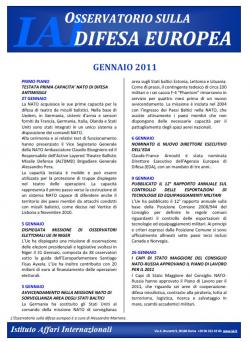Observatory on European defence, March 2001

26 March 2001
EU Military Organism – Appointment
General Gustav Hägglund, a Finn, has been named Chairman of the EU Military Committee (MC); the decision taken by the MC (with a majority of 8 to 7) will have to be approved by the Council.
German General Rainer Schuwirth has been named General Director of the EU Military Staff.
The Military Committee has been divided by the appointment of this President; the Italian candidate, General Mario Arpino, defeated by a one vote margin, has strongly criticised the election. The Italian candidate probably met the opposition of the “Nordic” countries (three votes), the “neutral” countries (two votes) and some “small” countries (arguably two votes). The identity of the eighth, decisive vote is unclear.
Beyond contingent and probably non decisive motivations and critiques, the decision underlines some weaknesses in the present organisation of the European Security and Defence Policy (ESDP): a substantial veto power by small countries (given that in the second pillar the intergovernmental rule provides each country with one vote, instead of vote-weighting as applies in other matters); the risk that the ESDP will be linked to “low spectrum” Petersberg Tasks only; the rise of further complications in the dialogue with the Atlantic Alliance.
March 2001
Ongoing discussions
During March, the political and institutional discussion on CFSP and ESDP centred on many different issues.
The core of debate with the US Administration was the Missile Defence project; there have been some initial informal hints of American willingness to open the project up to European allies. Apart from the political and strategic problems of possible future European involvement (mainly concerning Russia’s position), the economic impact of the programme has raised some concerns. Investing in the US project would divert a huge amount of funds that European countries are expected to dedicate to the European defence initiative.
Despite numerous meetings between ESDP institutions and the Atlantic Alliance, there has not yet been any success in establishing permanent EU access to NATO capabilities and guaranteeing the involvement of all NATO members in the decision-making process.
The last WEU Assembly underlined the lack of European Parliament involvement in ESDP. Although not a priority on the EU agenda, the matter is nevertheless important for the equilibrium of the institution-building process.There is growing pressure for formalising meetings of EU Defence ministers, creating an ad hoc Council independent from the Foreign Ministers Council.
There have been some common procurement initiatives to develop the military capability of EU countries; European institutions (mainly the OCCAR) could become increasingly involved in the management of these programs, guaranteeing the necessary support and guidance for the process.
-
Details
Roma, Istituto affari internazionali, 2001 -
Issue
01/03


